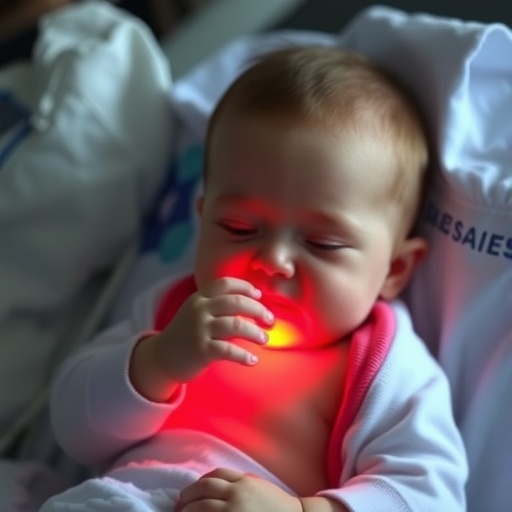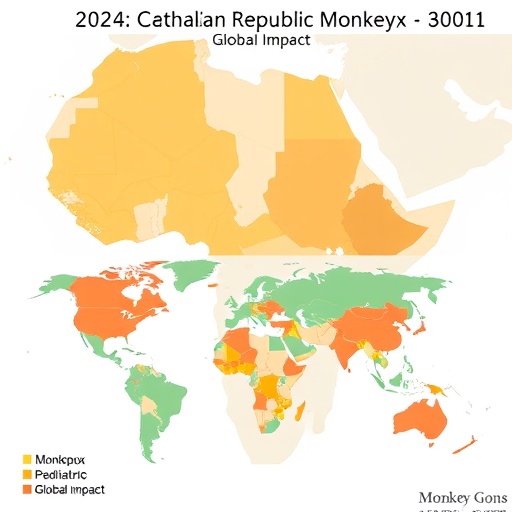PROTECT YOUR DNA WITH QUANTUM TECHNOLOGY
Orgo-Life the new way to the future Advertising by AdpathwayIn a groundbreaking study published in the latest edition of npj Viruses, researchers have unveiled compelling evidence that severe variants of SARS-CoV-2, the virus responsible for COVID-19, are intricately linked with gut infection and profound microbial dysbiosis. As the global scientific community continues to grapple with evolving strains of the virus, this research provides critical insights into the multifaceted pathology of COVID-19 beyond the respiratory system, emphasizing the crucial role of the gastrointestinal tract.
The investigation spearheaded by Nagaraj et al. highlights a paradigm shift in understanding viral pathogenicity. Traditionally, SARS-CoV-2 has been primarily associated with respiratory symptoms and complications. However, this study draws attention to the severity of infection being closely correlated with viral invasion of the gut mucosa, a revelation that underscores the virus’s systemic reach. This comprehensive approach to assessing viral impact reveals that variants causing more severe disease phenotypes demonstrate a propensity for intestinal infection, which in turn precipitates an imbalance in the gut’s microbial ecosystem.
Through meticulous genomic and virological analyses of clinical samples from patients infected with distinct SARS-CoV-2 variants, the team was able to pinpoint heightened viral loads within gastrointestinal tissues. This not only corroborates previous anecdotal reports of gastrointestinal symptoms in COVID-19 patients but also establishes a mechanistic link to disease severity. The viral colonization of the gut disrupts the delicate balance of commensal bacteria, leading to what is known as dysbiosis, a condition characterized by the loss of beneficial microbes and the proliferation of pathogenic species.
The study delves deeply into the molecular mechanisms governing this dysbiosis, revealing that gut infection by virulent SARS-CoV-2 variants disrupts the intestinal barrier function. The integrity of the gut lining, critical for preventing systemic inflammation, becomes compromised, allowing translocation of microbial products into the bloodstream. This triggers a heightened immune response, potentially exacerbating the infamous “cytokine storm” observed in critically ill patients, thereby linking gut pathology to systemic inflammatory manifestations.
Beyond the initial detection of viral genomes, transcriptomic profiling of intestinal biopsies painted a detailed picture of the host response. Genes involved in antiviral defense, tight junction assembly, and immune regulation manifested significant perturbations, indicating an ongoing battle between host defenses and viral strategies aimed at immune evasion. Such extensive cellular crosstalk underscores the complexity of SARS-CoV-2 pathogenesis, pushing forward the notion that management of COVID-19 requires a holistic understanding of affected organ systems.
Moreover, the findings suggest that the gut microbiome’s disruption might not only be a consequence but also a driver of severe disease progression. The depletion of key bacterial taxa known for their anti-inflammatory properties could leave the host vulnerable to uncontrolled immune activation. Conversely, overgrowth of opportunistic pathogens in the gut might exacerbate mucosal injury and systemic endotoxemia, setting the stage for multi-organ damage.
Crucially, the study’s longitudinal design allowed for observation of the temporal dynamics between viral infection and microbiome shifts. Patients with severe disease exhibited prolonged periods of gut viral shedding alongside persistent dysbiosis, reinforcing a feedback loop whereby ongoing intestinal infection perpetuates microbial imbalance, immune hyperactivity, and clinical decline. These insights highlight the potential of targeting the gut environment as an adjunctive therapeutic strategy.
The implications of these findings are multifold. Clinicians may need to incorporate gastrointestinal evaluation in the management protocols for patients infected with high-risk variants. Early detection of gut involvement and microbial imbalance could provide prognostic information, guiding more aggressive or tailored treatment regimens. Furthermore, strategies aimed at restoring microbial homeostasis, such as probiotics, prebiotics, or even fecal microbiota transplantation, could emerge as supportive therapies to mitigate severe disease outcomes.
This research also prompts reconsideration of viral entry pathways. The demonstration of active viral replication within the gut epithelium suggests that oral-fecal transmission routes might be more significant than previously appreciated, necessitating reinforced public health measures regarding hygiene and sanitation. The potential for the gastrointestinal tract to serve as a reservoir for viral persistence could also influence infection control guidelines and quarantine durations.
Technologically, the application of advanced sequencing methods alongside immunohistochemical and electron microscopic analyses elevated the robustness of these findings. The multi-modal approach allowed for cross-validation of viral presence, host response, and microbial community shifts, establishing a comprehensive model of gut involvement in severe COVID-19 cases. This multidimensional methodology exemplifies the future direction of infectious disease research, integrating virology, microbiology, immunology, and clinical science.
Future research stemming from this study may focus on unraveling the specific viral genetic determinants dictating gastrointestinal tropism and pathogenicity. Understanding these molecular features could pave the way for variant-specific interventions or vaccine enhancements targeting gut-associated aspects of the infection. Additionally, exploration of the gut-brain axis in the context of SARS-CoV-2 infection might reveal novel explanations for neurological symptoms reported in long COVID syndromes.
In summary, the landmark findings presented by Nagaraj and colleagues fundamentally redefine the landscape of SARS-CoV-2 pathology by establishing gut infection and microbiome dysbiosis as central features of severe disease. This work catalyzes a shift towards integrative clinical approaches and underscores the critical need to view COVID-19 as a multisystem disorder. As science and medicine continue to adapt to the evolving pandemic, such insights will be indispensable in crafting the next generation of diagnostic and therapeutic strategies.
This study resonates profoundly with the broader understanding of viral infections, where the symbiotic relationship between host and microbiota often dictates disease trajectories. Highlighting the gut as a critical battleground in COVID-19 infection aligns with growing evidence in other viral diseases, suggesting universal principles that could revolutionize infectious disease management. The recognition of the gut’s role adds a new dimension to the fight against coronavirus variants that continue to challenge global health systems.
As vaccine campaigns and antiviral pharmaceutical developments advance, integrating knowledge of gut involvement could optimize patient outcomes by preventing severe systemic complications associated with dysbiosis. This complexity also emphasizes the importance of personalized medicine, where microbial profiling and gut health assessments may guide treatment courses. The multi-organ impact of SARS-CoV-2, as identified here, reinforces the imperative for comprehensive clinical assessments encompassing diverse biological systems.
In the relentless battle against COVID-19, these revelations offer a beacon, encouraging researchers and clinicians alike to delve deeper into the enigmatic interplay between viruses, commensal microbes, and host immunity. This study acts not only as a scientific benchmark but also as a clarion call to embrace interdisciplinary research to conquer the challenges posed by pandemic pathogens.
Subject of Research: Severe SARS-CoV-2 variants; gut infection; microbial dysbiosis; COVID-19 pathology.
Article Title: Gut infection and dysbiosis are hallmarks of severe SARS-CoV-2 variants.
Article References:
Nagaraj, S.K., Joy, C.M., Shiraz, R. et al. Gut infection and dysbiosis are hallmarks of severe SARS-CoV-2 variants. npj Viruses 3, 74 (2025). https://doi.org/10.1038/s44298-025-00158-1
Image Credits: AI Generated
Tags: clinical samples SARS-CoV-2COVID-19 dysbiosisgastrointestinal symptoms COVID-19genomic analysis COVID-19gut mucosa viral invasionmicrobial imbalance COVID-19multifaceted COVID-19 pathologySARS-CoV-2 gut infectionSARS-CoV-2 variants researchsevere COVID-19 variantssystemic impact COVID-19viral pathogenicity gut


 3 hours ago
6
3 hours ago
6




















 English (US) ·
English (US) ·  French (CA) ·
French (CA) ·